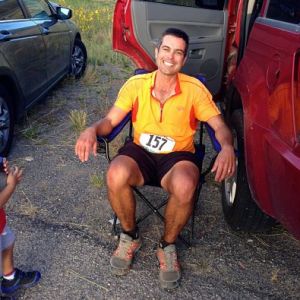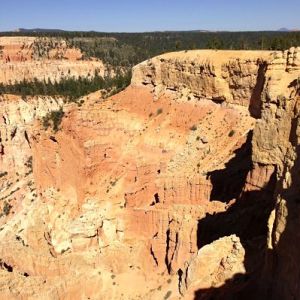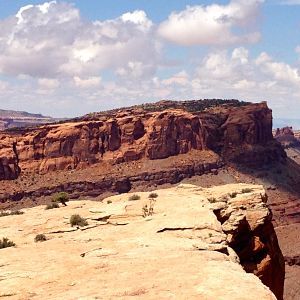
Jason Hardink
It’s no secret we have some pretty amazing people in our orchestra, but one musician in particular has recently demonstrated phenomenal ambition both on and off the stage. Jason Hardink, ourprincipal keyboardist, is not only an accomplished pianist, but also serves as Artistic Director of the NOVA Chamber Music Series and is a father to four-year-old twin boys. Any one of these are considered a full-time job on their own, but on top of everything, Jason recently ran the Wasatch Front 100 Mile Endurance Run. That’s right, 100 miles non-stop! We talked with Jason about his training regimen and the impact it has had on him as a musician.
Was this your first ultra marathon?
No, I ran the Grand Teton 50-mile a couple of summers ago. That’s the only other ultra to date for me.
How many marathons or half marathons have you done?
A couple of each. Funny, I enjoy 1/2 marathons and ultras more than plain old marathons, which are just too long to be pounding the pavement for my taste.
What made you want to start running further than a marathon?
Hard to say specifically, it’s been a gradual process. My idea of a good time is spending all day in the mountains. The thing is, I’m not too picky about the approach to any given peak. If it’s a rough and crazy bushwhack/scramble, fine, but if there’s really good trail or dirt road access, I’m also happy to throw on my running shoes and run to the top. Over the years, my idea of what a reasonable mountain run might look like has morphed from the 15-mile range to 20-40 miles. And that’s just purely for fun, with no ambitions to “train” for 100-mile race. But at some point I realized that I was essentially doing much of the training necessary for a long race, so why not enter one?
Yes, but 20-40 miles, while incredibly impressive, is a lot less than 100. Do you think you might be just a little bit, uhm…. crazy maybe?
I had lots of anxiety about the race all summer, and yes, I thought I was in over my head and crazy for signing up. Tackling something like this brings on a new sense of humility. You can’t approach this race with arrogance. I mean, come on- I had a hard time approaching it with any confidence, let alone ambition to do anything but finish. The whole undertaking is outrageous, but meeting other runners who are just as unhinged (if not crazier- can’t tell you how many people I met who have run this race anywhere from 6-20 times) helps convince you that finishing is possible.

Bryce Canyon
How does your family feel about your extreme running habit?
My boys are too young to have any sense of the magnitude of a race this long, they were just excited to goof off and eat M & M’s at the finish line. It’s very difficult to explain to someone, even your life partner, that you want to run a 100-mile race. The “why” is not so easy to articulate. My wife Kimi was extremely supportive and excited about the race, but I know she still thinks I’m nuts.
How do you find the time/balance?
My solution this summer was to pull our kids from daycare and take as much of the summer orchestra season off as I could. I did my long runs on days my parents could help watch the boys, and otherwise I tried to spend as much time with them as possible. My life was simpler this way- instead of trying to balance work/family/running I was only balancing family/running. And the money we saved on daycare balanced out any unpaid leave I took off from work. When you have kids, the whole balancing of an ordeal like this only works if you’re surrounded by supporting and loving people.
What was your training plan? Do you get bored or lonely running?
I ended up doing almost all my training on my own. My training plan was the result of consulting books and articles by runners with a great deal of experience and cobbling together a plan that made sense for me. I definitely never get bored running. I can admit that I’ve felt a sense of serious physical isolation that could almost be called loneliness on some of my more remote runs in the Uinta Mtns.
But that being said, the camaraderie among runners on race day was a very fun part of the experience. And having Llew Humphreys (2nd horn) run the last 25 miles with me- well, that was something. It was like having a pep squad cheerleader and drill sergeant from the Marines wrapped up into one person. That is one serious dude, I really owe him one.
What was your training schedule like?
I put all my focus on long efforts and recovery. At the peak of my training during the summer, my hardest efforts were back to back days totaling 60-70 miles. I always made sure I was recovered before heading back out the door- I knew that trying to run every day between the hard efforts would just get me injured. So my schedule had 2 very full days of running with much of the rest of the week off or devoted to short, easy efforts.
Do you listen to music while you run? What kind?
Definitely no music for me. For me there’s a basic safety issue -like getting run over by a mountain biker or jumped by a bear because I couldn’t hear them coming. But as a musician I find that the time away with some silence is a good thing. And I don’t know that a musician can really escape it anyway- the music is always playing.

Training near Moab
How long did it take you to run 100 miles? Did you take any breaks?
I tried to limit my stops at the aid stations to under 5 minutes if possible, with the exception of Lambs Canyon (52 miles) and Brighton (75), where I tried to sleep in the car for 5-10 minutes, change clothes/shoes, eat as much as I could stomach, take Advil, switch out necessary gear (new headlamp). I finished the race in 29 hours and 13 minutes. Llew knew I really wanted to finish under 30 hrs, and much of my motivation during the last 15 miles came from him constantly nagging/encouraging/riding me about our pace as well as my own paranoia that I was convinced until the very end that we were going to miss the 30 hr mark.
Do you think any of your experience, either racing or training, translates into lessons that might be applied to your life as a musician?
Definitely, particularly regarding things like preparation, attitude, mental poise, musical pacing. I could load more effort on to the front end of my preparation for concerts, a strategy that you must utilize preparing for a race like this. You taper your training load as you approach a long race, hardly running at all the week of the event. As a musician, I indulge in tons of last-minute neurotic practicing that probably only serves to tire me out for the concert in question.
So what’s next?
I’ll still be doing my runs in the mountains, but I’m very much undecided about other long races. It was fantastic to be able to meet a lot of other local runners through this experience- SLC has a great trail and ultra running scene. I think I will definitely enter some of the local 50ks or 50-milers in future seasons just to stay connected with that group of people.
Way to go Jason!!
– Mercedes Smith
